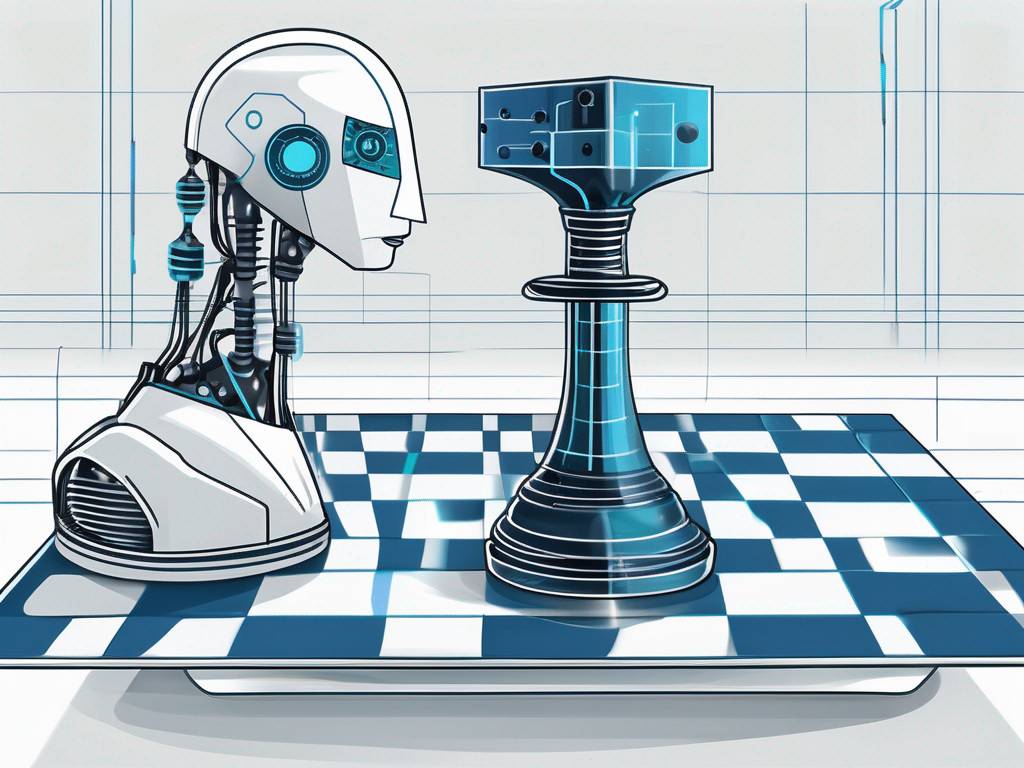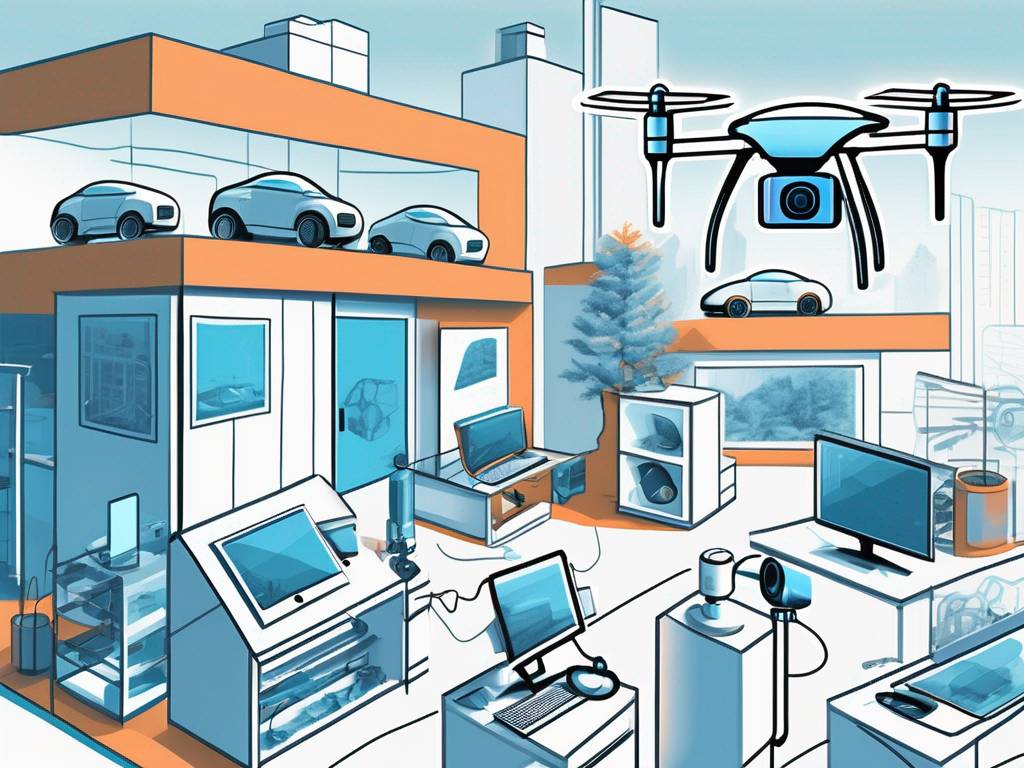AI Applications in Manufacturing: Revolutionizing the Industry
Key Insights
- Artificial Intelligence (AI) is revolutionizing the manufacturing industry and transforming the way factories operate
- The integration of AI in manufacturing processes enhances efficiency, improves quality control, and reduces operational costs
- Implementing AI in manufacturing comes with challenges such as data security concerns, skills gap, and ensuring reliable and robust systems
- The future of AI in manufacturing holds promising advancements and requires industry leaders to prepare for an AI-driven industry
The future of manufacturing is undeniably AI-driven. As technology continues to advance, AI will play an even more significant role in transforming the industry. From predictive maintenance to autonomous robots, AI will enable manufacturers to achieve unprecedented levels of productivity and innovation. Industry leaders must embrace this shift and invest in AI research and development to stay ahead of the competition. The future is bright for manufacturers who are willing to adapt and harness the power of AI.
Understanding the Basics of AI in Manufacturing
Artificial Intelligence (AI) is a branch of computer science focused on creating intelligent machines capable of performing tasks that usually require human intelligence. In the context of manufacturing, AI refers to the utilization of intelligent systems and algorithms to enhance various processes.
The Role of AI in Modern Manufacturing
AI plays a crucial role in modern manufacturing by automating and optimizing production processes. By incorporating AI into manufacturing processes, companies can achieve unprecedented levels of efficiency.
One of the key areas where AI is making a significant impact is in quality control. Traditional quality control methods often involve manual inspection of products, which can be time-consuming and prone to human error. With AI, manufacturers can implement automated quality control systems that use computer vision and machine learning algorithms to detect defects and anomalies with a high level of accuracy. These systems can analyze images or sensor data in real-time, identifying any deviations from the expected standards and triggering immediate corrective actions.
Another area where AI is revolutionizing manufacturing is predictive maintenance. By continuously monitoring the performance of machines and analyzing data from sensors, AI algorithms can detect early signs of equipment failure or deterioration. This enables manufacturers to schedule maintenance activities proactively, minimizing unplanned downtime and optimizing the lifespan of their machinery. Predictive maintenance not only reduces costs associated with repairs and replacements but also improves overall productivity by ensuring that machines are operating at their optimal levels.
AI is being utilized in supply chain management to optimize inventory management and demand forecasting. By analyzing historical sales data, market trends, and other relevant factors, AI algorithms can accurately predict future demand for products. This helps manufacturers optimize their inventory levels, ensuring that they have the right amount of stock at the right time, reducing the risk of stockouts or excess inventory. Additionally, AI can help identify potential bottlenecks in the supply chain, enabling manufacturers to make informed decisions to improve efficiency and reduce costs.
AI is also transforming the field of product design and development. By leveraging AI-powered design tools, manufacturers can automate the creation of product prototypes and simulations, significantly reducing the time and cost involved in the design process. AI algorithms can generate multiple design options based on specified parameters, allowing engineers to explore a wider range of possibilities and make more informed decisions. This not only speeds up the product development cycle but also enhances innovation by enabling manufacturers to experiment with new ideas and concepts.
AI is revolutionizing the manufacturing industry by automating processes, improving quality control, enabling predictive maintenance, optimizing supply chain management, and enhancing product design and development. As AI continues to advance, it is expected to drive further innovation and efficiency in manufacturing, ultimately leading to increased productivity and competitiveness in the global market.
The Intersection of AI & Manufacturing
Artificial Intelligence (AI) has emerged as a powerful tool in transforming manufacturing processes. With its ability to analyze vast amounts of data and make intelligent decisions, AI is revolutionizing the way factories operate. By leveraging AI technologies, manufacturers can achieve higher levels of efficiency, productivity, and cost-effectiveness.
One of the key ways AI is transforming manufacturing processes is through predictive maintenance. Traditionally, maintenance in factories has been reactive, where machines are repaired or replaced after they break down. However, with AI, machines can now detect potential faults and notify operators before breakdowns occur. This proactive approach minimizes downtime, enhances productivity, and reduces maintenance costs. For example, AI algorithms can analyze sensor data from machines to identify patterns that indicate an impending failure. By predicting when a machine is likely to fail, operators can schedule maintenance activities in advance, ensuring that production is not disrupted.
In addition to predictive maintenance, AI integration within manufacturing systems enables real-time monitoring, analysis, and control. Smart sensors and algorithms can continuously monitor production lines, collecting data on various parameters such as temperature, pressure, and speed. This data is then analyzed in real-time by AI algorithms, which can identify any deviations from optimal conditions. Based on these insights, the algorithms can automatically adjust settings and optimize parameters to improve product quality and minimize waste. For example, if a sensor detects that the temperature in a particular part of the production line is too high, the AI system can automatically adjust the cooling system to bring it back to the desired level.
AI can also play a crucial role in quality control. By analyzing data from sensors and cameras, AI algorithms can detect defects or anomalies in products with a high level of accuracy. This allows manufacturers to identify and rectify issues early in the production process, reducing the number of defective products reaching the market. Additionally, AI can help optimize the supply chain by predicting demand patterns, optimizing inventory levels, and improving logistics efficiency.
Benefits of AI in Manufacturing
As AI continues to advance, its applications in manufacturing are only expected to grow. From autonomous robots and drones to intelligent supply chain management systems, AI is poised to revolutionize the entire manufacturing industry. By embracing AI technologies, manufacturers can unlock benefits like:
- Enhancing Efficiency and Productivity: AI-driven automation reduces manual labor, allowing manufacturers to optimize their workforce and improve productivity. With AI systems handling repetitive and time-consuming tasks, employees can focus on more complex and value-added activities.
- Improving Quality Control: AI technologies, such as computer vision, enable real-time monitoring and analysis of product quality. By detecting defects and anomalies during production, manufacturers can implement corrective measures promptly, leading to higher-quality products and reduced rework.
- Reducing Operational Costs: By optimizing production processes, AI reduces operational costs in manufacturing. Predictive maintenance and real-time monitoring prevent unexpected breakdowns and minimize downtime, resulting in cost savings. Additionally, AI helps identify areas of waste and inefficiency, enabling manufacturers to streamline operations and cut unnecessary expenses.
Challenges & Solutions in Implementing AI in Manufacturing
While the benefits of AI in manufacturing are undeniable, there are challenges that need to be addressed. Some of these challenges include:
- Overcoming Data Security Concerns: When implementing AI in manufacturing, safeguarding sensitive data becomes a priority. Manufacturers need to invest in robust cybersecurity measures to protect intellectual property, customer information, and operational data. By partnering with trusted technology providers and adopting encryption methods, manufacturers can mitigate risks and ensure data security.
- Addressing the Skills Gap: Implementing AI in manufacturing requires skilled professionals proficient in both advanced technology and manufacturing fundamentals. Industry leaders need to invest in training programs and collaborate with educational institutions to bridge the skills gap. By empowering the existing workforce and attracting potential talent, manufacturers can maximize the benefits of AI.
- Ensuring Reliable & Robust AI Systems: Reliability and robustness of AI systems are vital in manufacturing. Manufacturers must focus on developing AI systems that undergo rigorous testing and validation, ensuring their ability to handle real-world complexities and unforeseen scenarios. Implementing redundant systems and contingency plans can minimize the risk of AI failures and guarantee continuous production processes.
The Future of AI in Manufacturing
Predictions for AI Advancements
The future of AI in manufacturing holds great promise. Advancements in machine learning algorithms, natural language processing, and robotics are expected to redefine manufacturing processes. AI models capable of self-learning and adaptation will enable manufacturers to achieve even higher levels of automation, customization, and efficiency.
Preparing for an AI-Driven Manufacturing Industry
Industry leaders, C-level executives, and operators in the manufacturing space need to prepare for the AI-driven future. It requires embracing AI technologies, investing in research and development, and fostering a culture of innovation. By staying informed about AI trends, collaborating with AI experts, and strategically implementing AI solutions, manufacturers can harness the full potential of AI and maintain a competitive edge in the evolving landscape.

 hello@westlink.com
hello@westlink.com  (866) 954-6533
(866) 954-6533  700 N Colorado Blvd,
700 N Colorado Blvd,






Comments